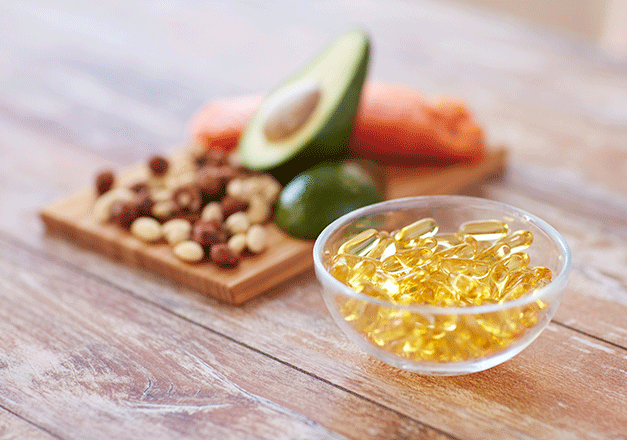
The therapeutic benefits of omega-3 fatty acids – which are abundant in certain fish oils – have long been known. In the 1950s, upon the discovery that omega-3 improves brain development, cod liver oil was given for free to young children, pregnant women, and nursing mothers. In the 80s, scientists reported that eskimos enjoy better coronary health than their mainland counterparts as a result of their fish rich diets. And in 2009, a study published in the Menopause journal suggested that omega-3 helps reduce the frequency of hot flushes in menopausal women.
As you can see, the hype that surround omega-3 is warranted, and not something to be shied away from.
The truth about fats
Many women are concerned about fat, and wrongly believe that consuming fat will make them overweight. The truth is, however, that an extremely low-fat diet won’t regulate your weight – and it certainly won’t enhance your health. Fat can be hugely beneficial in the right form, and by consuming fatty acids such as omega-3, you will surely be more healthy.
Research has confirmed that omega-3 fatty acids may have an excellent effect on impacting degenerative diseases, such as heart disease, rheumatoid arthritis, hypertension, Alzheimer’s disease, diabetes, and many more. As for menopause, omega-3 fatty acids contain anti-inflammatory properties shown to have a positive effect on many of the symptoms associated with “the change”.
What’s so ‘essential’ about essential fatty acid?
If we look at the molecular level, essential fatty acids (EFAs) help protect and keep your cardiovascular, musculoskeletal, gastrointestinal, and immune systems functioning at their best. EFAs help to insulate your nerve cells and produce molecular messengers that become part of your central nervous system and your body’s immunity.
As your body cannot produce essential fatty acids, it’s essential that you get them from your diet. Once obtained, you will find them in every cell of your body!
Good essential fatty acids come in three forms – omega-3, omega-6, and omega-9. Omega-3 is a polyunsaturated acid and is the most important of the three, due to its ability to suppress inflammation and its positive effect on bone density. Unfortunately, omega-3 is usually the most lacking in modern diets.
What can omega-3 help with?
Because of its wonderful properties, omega-3 can greatly help women during menopause. It helps treat a range of menopausal symptoms, such as:
- Hypertriglyceridemia– Postmenopausal women may have higher triglyceride concentrations than premenopausal women, exposing them to increased risk of coronary heart disease. As omega-3 offers a triglyceride-lowering effect, many practitioners recommend menopausal women obtain a bare minimum 1g/day as provided by your diet or supplementation.
- Joint pain/menopause arthritis– Omega-3 fats can reduce inflammation, which may help relieve joint pain and stiffness related to menopause arthritis. Omega-3s work in a similar way as non-steroidal anti-inflammatory drugs (NSAIDs).
- Menstrual pain – As part of your ovaries’ frustrating grand finale, perimenopausal women often experience strong menstrual pain and cramping. This pain is often caused by substances called prostaglandins, which come in both “good” and “bad” form. Menopause promotes the bad kind, while omega-3 fatty acids promote the good kind.
- Depression– Women are twice as likely to suffer depression compared with men, and the risk is even greater following menopause. Irritability and sadness are common emotional symptoms of menopause, but omega-3 may effectively alleviate these symptoms. Omega-3s work to improve mood and restore structural integrity to brain cells that are critical in performing cognitive functions.
- Osteoporosis– An increased intake of omega-3 acids increases bone mineral content and produces healthier, stronger bones. As menopause can increase a woman’s risk of developing osteoporosis due to a drop in oestrogen levels, omega-3 fatty acids should be an essential part of a menopausal diet.
- Hot flushes– The frequency of hot flushes in women going through menopause can vary from as little as once a week to every 30 minutes. Some hot flushes last minutes, while others a mere few seconds. Studies have shown that while omega-3 may not affect the intensity of hot flushes, it can halve the frequency of hot flushes with the right dosage.
- Vaginal dryness– Fatty acids help to lubricate the body in general, therefore helping with dryness of the vagina – a common symptom of menopause.
How to get enough omega-3 fatty acids
When possible, getting omega-3 fatty acid through your diet is preferred. Recent recommendations are that women consume two percent of their total daily calories as omega-3 fats. To meet this recommendation, a person consuming 2000 calories per day would need to eat at least two grams of omega-3 fats per day.
While this may seem like a lot, there are many foods that are excellent sources of omega-3. These include:
- Oily fish, such as tuna, salmon, herring, sardines and mackerel,
- Flaxseed and canola oil,
- Walnuts and walnut oil,
- Chia seeds,
- Oysters,
- Spinach,
- Soybeans,
- Eggs,
- Marine microalgae, and
- Hempseed oil.
Alternatively, you can source your omega-3 via a supplement. A standard 1000mg fish oil capsule will usually contain 120mg docosahexaenoic acid (DHA) and 180mg eicosapentaenoic acid (EPA) – a total of 300mg DHA + EPA. These are the two essential long-chain omega-3s shown to be most beneficial to menopausal women.
The Australian National Health and Medical Research Council (NHMRC) suggests a daily intake of 430mg DHA + EPA per day. As this is more than the amount commonly found in a standard fish oil supplement, a good idea for menopausal women is to combine their fish oil supplement with a diet rich in omega-3. The quality and quantity of active ingredients of the fish oil within supplements vary and it is important to speak to one of our Naturopaths on the best formula to suit your individual needs. Cheaper is definitely not better in the case of oils. Any oil that smells fish is likely to be oxidised and therefore not recommended.